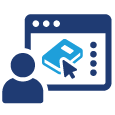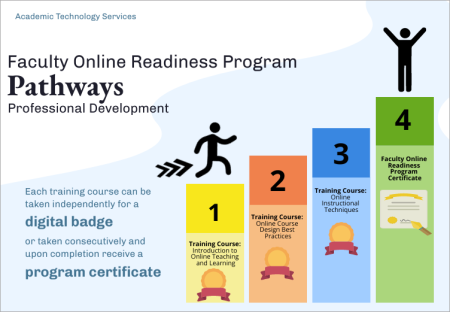Faculty Online Readiness Program
The Faculty Online Readiness Program (FORP) is a foundational experience for faculty interested in developing or improving online courses. No prior knowledge of online teaching is required to participate. To enroll in the program, please submit the online form:
2025-2026 Program
FORP enrollment is open throughout the fall and spring semesters; faculty can conveniently choose their start date and pace of participation.
- Open enrollment through the fall and spring semesters.
- To receive badges for completion, all deliverables are due June 30, 2026.
- Faculty may enroll in any or all of the three sessions offered.

Canvas Courses
Participants will be enrolled in self-paced courses in Canvas to discover concepts and resources for online course design.

Course Development Support
ATS Instructional Designers will build course content and media or provide other support as desired.

Peer Review and Consultation
CSULB Faculty Peer Reviewers and ATS Instructional Designers are paired with participants to provide feedback.
Digital Badges
Participants earn badges for completing each FORP session. A culminating badge is awarded for completing all 3 FORP sessions.
RTP Documentation
Documentation of program completion is available upon request for participants to include in RTP portfolios.

Digital badges will be awarded to participants who complete the following requirements for each session by June 30, 2026.
A culminating badge will be awarded to participants who complete all 3 sessions of FORP by June 30, 2026.
- Complete the Canvas course for the session in which you are enrolled.
Complete the course content and actively participate in the online discussion boards. - Work with an assigned ATS Instructional Designer.
FORP participants will work closely with an Instructional Designer for the duration of their participation. The Instructional Designer will support faculty in the application of concepts covered in each session. - Apply the quality course design and delivery checklist.
Each session will include a checklist with elements of online course design and delivery. The checklist was developed by our instructional design team and our faculty quality assurance community of practice. The checklist is meant to guide faculty through the design, development, and delivery of their online course and confirms that quality assurance exists within the course. Requirements to complete each session will consist of implementing each checklist item to any chosen course and having the course reviewed by a peer review faculty member and Instructional Designer. - Complete the anonymous course evaluation survey.
A link to the survey will be provided at the end of the program.
What does "open enrollment" mean?
Open enrollment means that you can enroll in the course whenever it suits you and begin and end the program at your convenience.
What are the program deliverable deadlines?
Since FORP is an open enrollment program you can start and end the program at your convenience. However, since this program being offered for the academic year, the last day to submit deliverables is June 30, 2026.
When does registration open and close for FORP?
FORP registration opens the first day of the Fall semester and the registration ends a month before the last day of the Spring semester. This allows for those interested in enrolling in FORP in the Spring semester to have about a month to complete the program and submit deliverables by the last day of school.
Can I enroll in more than one session at a time?
Yes, you can enroll in as many sessions as you like simultaneously or one at a time, whatever you prefer and your schedule allows.
How is FORP different from other ATS professional development courses such as the Instructional Technology Foundations (ITF) and Online Learning Studio (OLS) programs offered in the past?
The majority of FORP content is brand new; topics such as Diversity Equity, and Inclusion (DEI) have been included. This program considers more nuanced issues of teaching online and presents tips and best practices that can be implemented in the classroom. ITF and OLS only briefly covered the basics of these topics.
Does this program only focus on course design?
In each FORP session, participants will have the opportunity to learn about course delivery and course design.
Am I required to complete this program to teach online courses at the University?
No. Participation in or completion of this program is not required to teach online. However, documented professional development to teach online may be considered as one aspect of a faculty member's qualifications for teaching in hybrid, hyflex, or synchronous and asynchronous online modalities. Completing FORP sessions will be a benefit for anyone intending to teach online in future semesters.
FORP Sessions
After registering for each FORP session, you'll receive a welcome email from your assigned ATS Instructional Designer (ID) with an initial meeting invite, course access instructions, and details about the peer review process.
In the self-paced Canvas course for this session, participants will:
- Apply key structural elements and best practices for online teaching and learning.
- Distinguish between different modalities of online learning.
- Review strategies for engaging students in an online environment.
Estimated Hours to Complete: 3-5 hours
In the self-paced Canvas course for this session, participants will:
- Define the course modality migration process in Canvas.
- Examine the design of effective online learning objectives.
- Identify appropriate technology tools for online teaching and learning.
- Recognize accessibility components in courses and documents.
Estimated Hours to Complete: 6-8 hours
In the self-paced Canvas course for this session, participants will:
- Recognize effective online course assessment design.
- Identify the benefits of administering constructive feedback.
- Review opportunities to foster diversity, equity, and inclusion and approaches to creating community among students in an online environment.
- Apply workload streamlining strategies.
Estimated Hours to Complete: 6-8 hours





